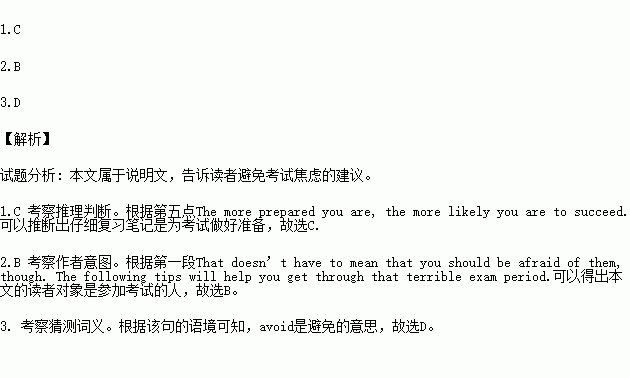题目内容
Very few people look forward to and enjoy exams. That doesn’t have to mean that you should be afraid of them, though. The following tips will help you get through that terrible exam period.
Here are eight steps to help you during exams:
1. Make sure you know how much time you will have in the exam, and how many questions there will be. Then you can divide your time among the questions to make sure that they all get answered.
2. When you’re doing an exam that involves (涉及) long answers, it is a good idea to leave some space at the end of the answer so that you can add any extra comments that might come to mind when you reread your paper.
3. Don’t spend all of your time only on questions that you know the answer to because you will get a worse mark for answering some questions very well and some not at all.
4. It is worth taking a little extra time to make sure that your handwriting is neat. Then the examiner will be able to read it! Try to avoid spelling mistakes too!
5. The more prepared you are, the more likely you are to succeed.
6. Keep calm. If you feel yourself getting worried, take a deep breath.
7. Don’t try to discuss the exam after you’ve finished it. If you’ve got different answers from your friends, there’s no point worrying about it.
8. Once an exam is over, just forget about it. There is nothing more you can do about it. The best thing you can do is to go home and prepare for the next one.
1. You can get a better mark if ______.
A. you spend all of your time on questions that you are not good at
B. you discuss the answers with your friends after exams
C. you go over your notes carefully for the exam
D. you spend most of your time on questions that you know well
2. The passage is probably written for ______.
A. people who mark exam papers
B. people who take exams
C. high school teachers
D. language learners
3.The underlined word “avoid” in the passage most probably means “______”.
A. check out
B. go over
C. think about
D. prevent something from happening
 天天向上一本好卷系列答案
天天向上一本好卷系列答案 小学生10分钟应用题系列答案
小学生10分钟应用题系列答案
